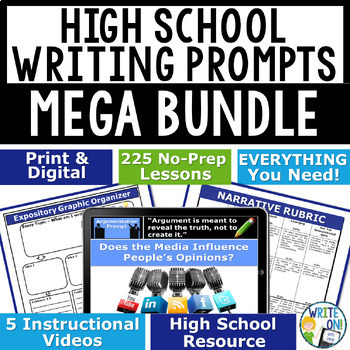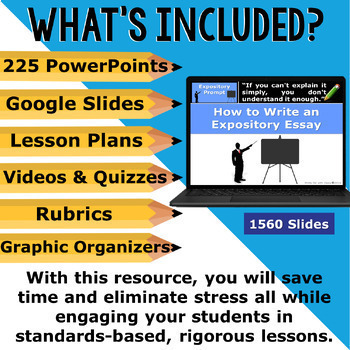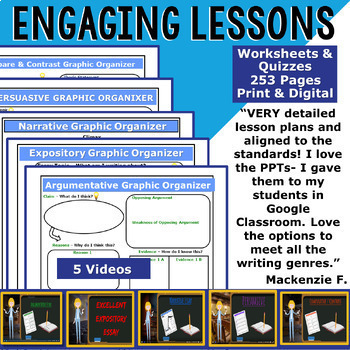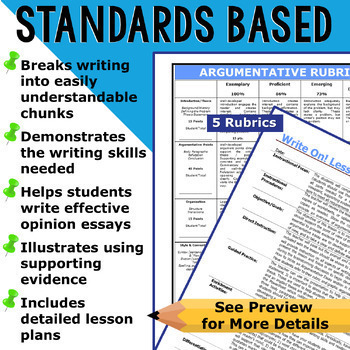Writing Prompts Essay Lessons w/ Graphic Organizers - High School Mega Bundle
- Zip
- Google Apps™
- Easel Assessment

Products in this Bundle (140)
showing 1-5 of 140 products
Bonus
Description
Introducing how to write essays has never been easier! This in-depth mega bundle includes 253 Lessons. The Essay Prompt Lessons (Argumentative, Expository, Compare & Contrast, Narrative, and Persuasive). The lessons each include a writing graphic organizer, rubric, writing quiz, detailed lesson plans, an instructional video, and a writing template.
All aspects of writing are covered in these lessons: brainstorming ideas, thesis statement development, introducing supporting evidence, writing hooks and leads, developing a plot, introducing characters, writing a narrative hook, and incorporating the 6 Traits of Writing.
The lessons can be used in class or assigned for distance learning as independent student work. The instructional videos with writing tutorials can also be presented as whole class instruction or assigned for students to complete at home.
The video, slide shows, graphic organizer, worksheets, writing template, and rubric allow students to practice and develop their writing skills. The writing quiz reinforces guided note-taking techniques when used in conjunction with the instructional video. The detailed lesson plans make implementing essay writing easy for teachers.
These lessons can be used in class, assigned for distance learning, or given as independent student work. The instructional videos with writing tutorials and templates can also be presented as whole class instruction or assigned for students to complete at home.
Each resource listed below is included in Google Drive™ and print format.
*****************************************************************************************
This unit has 253 Writing Prompts lessons and each lesson includes:
An Entertaining Instructional Video:
- Brainstorming Ideas
- Prompt identification and comprehension
- Thesis statement development
- Rubric explanation
- How to Write an Essay tutorial
Detailed Lesson Plans:
- Common Core State Standards indicated on lesson plan
- Instructional focus
- Instructional procedures
- Objectives/goals
- Direct instruction
- Guided practice
- Enrichment
- Differentiation
- ESE strategies
- ELL strategies
- I Can Statement
- Essential Question
Student Worksheets:
- Prompt
- Brainstorming section
- Thesis statement development
- How to Write Essay tutorial
PowerPoint Presentation:
- Introduction slide with prompt (interactive for students to identify key vocabulary)
- Brainstorming slide (interactive for students to list ideas)
- Standard and implied thesis development slides
- How to Write an Essay tutorial slides
- Checklist slide
5 Essay Quizzes (Argumentative, Expository, Narrative, Persuasive, Compare and Contrast)
5 Essay Rubrics (Argumentative, Expository, Narrative, Persuasive, Compare and Contrast)
5 Graphic Organizers (Argumentative, Expository, Narrative, Persuasive, Compare and Contrast)
Google Slides
*****************************************************************************************
Connect with me for the latest Write On! with Jamie news:
. . . and visit my WRITE ON! with Jamie website for a free TEXT EVIDENCE WRITING LESSON!
Write On!
Jamie
© Google Inc.™ All rights reserved. Google™ and the Google Logo are registered trademarks of Google Inc.™ Write On! with Jamie® is an independent company and is not affiliated with or endorsed by Google Inc.™
Terms of Use
Copyright © Write On! with Jamie. All rights reserved by author. All components of this product are to be used by the original downloader only. Copying for more than one teacher, classroom, department, school, or school system is prohibited unless additional licenses are purchased. This product may not be distributed or displayed digitally for public view. Failure to comply is a copyright infringement and a violation of the Digital Millennium Copyright Act (DMCA). Clipart and elements found in this product are copyrighted and cannot be extracted and used outside of this file without permission or license. Intended for classroom and personal use ONLY.





